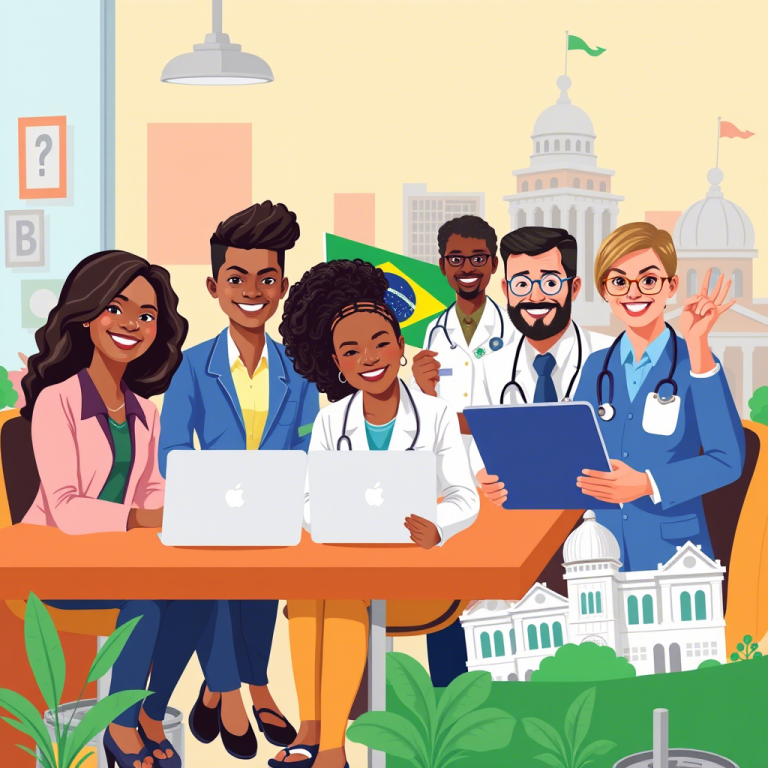
Have you ever stopped to think about how technology is changing the way we work? Digital transformation isn't just a trend; it's an inevitable movement that's shaping workplaces around the world.
From simple automation to advanced artificial intelligence, digital tools are redefining roles, processes, and even entire careers. Are you ready for this change?
In this article, we'll explore practical strategies to prepare for this new landscape, ensuring you not only keep up with but also seize the opportunities that arise with technological evolution.
The relevance of this topic goes beyond technical interest: we're talking about your ability to thrive in a professional future where innovation will be the norm. Let's dive into this process together, discussing everything from essential skills to the mindset needed to navigate this new era.

Digital transformation isn't just about adopting new technological tools. It involves a cultural shift, in which companies and professionals need to rethink how they operate and interact.
Imagine a traditional company that decides to migrate its manual systems to cloud-based platforms—this might seem like just a technical upgrade, right? Wrong! In fact, this decision directly impacts how teams collaborate, make decisions, and manage resources.
Data shows that 70% of organizations have already initiated some type of digital transformation project. However, many still face cultural challenges and internal resistance.
Therefore, understand why this transformation is necessary and is as important as learning as implement it. To begin, reflect: what areas of your work could be optimized through technology?
Practical tip: Make a list of the repetitive or bureaucratic tasks in your daily life. Ask yourself: "Is there a tool that can simplify this?" Often, solutions already exist—you just need to know how to look for them.
When we think about digital transformation, it's easy to focus exclusively on technical skills, such as programming or specific software knowledge. However, soft skills (interpersonal skills) remain essential. After all, who will interpret the data generated by machines? Who will lead complex projects in remote teams?
A recent survey revealed that skills such as effective communication, problem-solving, and critical thinking will be even more valued in the coming years. This is because, while technology automates routine tasks, the human touch remains indispensable for creating genuine connections and making strategic decisions.
To illustrate, imagine a marketing team using artificial intelligence to analyze market trends. Without the ability to interpret these insights and adapt them to customer needs, the impact of these tools would be limited. Therefore, invest in both technical training and personal development.
Recommendation: Enroll in free or paid online courses that cover topics like time management, leadership, and creativity. These skills will complement any technical expertise you acquire.
"There's nothing more dangerous than thinking you already know everything." This quote captures the spirit needed to navigate digital transformation. In a world where technology evolves rapidly, standing still can mean falling behind. But how can you stay up-to-date without feeling overwhelmed?
Adopting a continuous learning mindset means always being willing to try new things. Don't be afraid to make mistakes—after all, every mistake is an opportunity for growth. Also, seek inspiration from other sectors or industries. Sometimes, innovative solutions come from unexpected places.
For example, a fashion startup can learn from the practices of tech startups, while an engineering company can incorporate agile methodologies used in software development. The key is to connect seemingly disparate dots to generate unique ideas.
Motivating Story: Steve Jobs often said that the beauty of Apple products came from his passion for graphic design and calligraphy—something he learned in a college class that had nothing to do with technology. Get inspired!
As more companies move to the digital environment, cybersecurity becomes a growing concern. Sensitive data, financial information, and even intellectual property are at risk daily. How can you protect both your organization and yourself in this context?
First, it's crucial to understand the main types of cyberthreats, such as phishing, ransomware, and social engineering attacks. Then, follow some basic practices:
Additionally, participate in your company's digital security training. Remember: a single wrong click can compromise the entire system.
Shocking Statistics: Studies indicate that 95% of data breaches occur due to human error. Be prepared to avoid becoming part of this statistic.
Digital transformation shouldn't be seen as a threat, but rather as a gateway to new possibilities. Old professions can evolve, while completely new ones emerge. Consider the case of chatbots: initially met with skepticism, they have now revolutionized the customer experience across several industries.
If you're worried about technology replacing your role, remember that it exists to expand our capabilities, not reduce them. Instead of fighting change, find ways to integrate it into your work. Ask yourself, "How can I use this tool to improve my performance?"
Final Inspiration: Kodak's story is often cited as an example of how ignoring transformation can lead to downfall. On the other hand, companies like Netflix have adapted to change and achieved lasting success. Which path do you want to follow?
Digital transformation is here to stay, and the future belongs to those who know how to harness it. We review five crucial aspects to prepare for this new landscape: understanding the concept of digital transformation, investing in technical and interpersonal skills, adopting a continuous learning mindset, prioritizing cybersecurity, and, finally, seeing change as an opportunity.
Now it's your turn: how do you plan to apply these lessons to your professional life? Leave a comment sharing your insights or experiences. Together, we can build a more prepared and resilient future.
And remember: the only constant in the digital age is change. Always stay one step ahead!